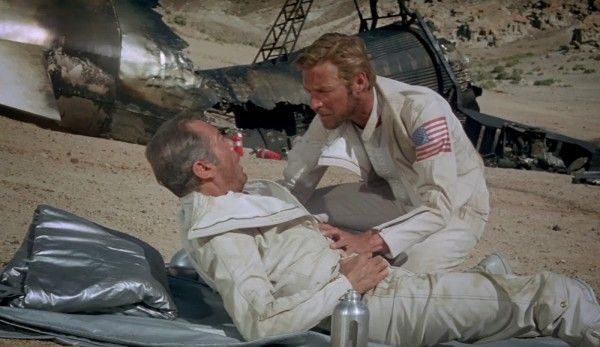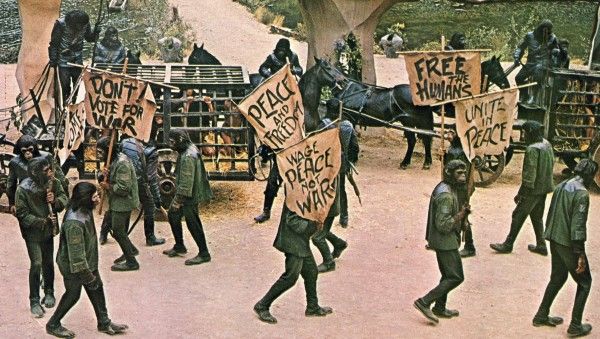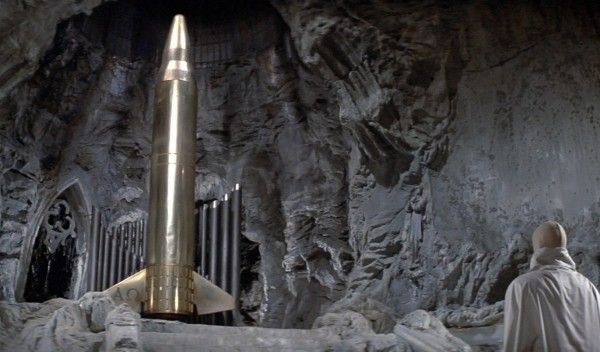“The Only Good Human Is a Dead Human”: Looking Back at BENEATH THE PLANET OF THE APES
JULY 4, 2014

[With Dawn of the Planet of the Apes opening on Friday, July 11th, I’m taking a look back at the Planet of the Apes movie franchise. These reviews contain spoilers.]
When your movie ends with one of the most dramatic and shocking conclusions in cinematic history, where do you go from there? Revelations can lead to reconciliations, but Beneath the Planet of the Apes couldn’t even reconcile its two plotlines. Where Planet of the Apes was able to tie the tensions of the 1960s to a greater look at the human condition, Beneath suffers from schizophrenia where it wants to say something, but lacks the cleverness, timing, and consistency to do so. The film is still filled with interesting ideas and settings, but in its haste to make a grand, vague statement, Beneath forgets its greatest asset: apes.
[Side note: Unlike my X-Men retrospective, this is my first time viewing some of the films in the franchise. I’ve never seen any of the Apes sequels until now.]
After we hear some narration of the Sacred Scrolls, Beneath the Planet of the Apesuses the conclusion of the first film as a prologue, which hints at the sequel’s hesitation to find its own identity. Anyone who saw the first film would never forget its conclusion, and so what’s meant as a transition ends up feeling like a crutch since we then go to another crashed spaceship, which is where the story really begins.
The spaceship has followed Taylor’s trajectory, and was intended as a rescue mission, but Brent (James Franciscus) is the lone survivor of the crash. He quickly meets Nova (Linda Harrison), who is wearing Taylor’s dog-tags, but still lacks the ability to speak. We then receive scattered flashbacks revealing that Taylor mysterious disappeared. Since Brent is unaware of this development, he decides to ride along with Nova, but their journey leads them back to the ape village.
This is where the film starts to get interesting as we’re introduced to General Ursus (James Gregory), a gorilla who is preaching rhetoric very similar to the military during the Vietnam War. “The only good human is a dead human,” he cries to a gathering of apes. Among the crowd is Dr. Zaius (Maurice Evans), Dr. Zira (Kim Hunter), and Cornelius (David Watson), and all of them look less-than-pleased with Ursus’ cries for war. “Invade! Invade! Invade!” he shouts in his attempt to rally the apes to invade the Forbidden Zone. Ursus believes there are more humans hiding out in the zone, and they need to be snuffed out to make more room for the apes.
Brent, like Taylor, is shocked by talking apes, but the movie hints that he’s also shocked by their brutality, which is a surprise when you consider the brutality of the 20th century. It’s a rare moment where Brent is interesting since we’re unsure if he shares Taylor’s cynicism about the past, but Brent’s personality quickly fades once he’s on the run. Taylor may have been a dick, but Charlton Heston had charisma to spare, and his righteous fury permeates the original. Brent is a nice guy, but it looks like the reason he was hired was because he looked good with his shirt off. It’s not a bad performance, but there’s nothing distinct about it, especially since it’s bounced between two societies with little insight into either.
The movie then runs a condensed repeat of what happened to Taylor in the first movie: Brent and Nova are helped by Zira and Cornelius, run away, are recaptured, and escape with the help of Zira. It’s not until halfway through the picture that Brent and Nova go “beneath” and discover New York City’s subway tunnels. It’s also where Brent realizes he’s on Earth, which reminded me that the character didn’t know where he was. The revelation doesn’t have much of an impact, and while Franciscus plays the shock well, the dramatic impact for the audience has worn off. It’s time to explore, and while the movie takes us someplace new, it no longer jibes with the world we saw before.
The apes fall far into the background as Brent discovers a new society of humans living underground, and it turns out they’re even crueler than the apes. They use their telepathic powers to not only cause illusions, but mental anguish to the point where they can force their victims to kill others. “We don’t kill our enemies,” Brent is told by his captors. “We get our enemies to kill each other.” If that weren’t enough, the underground society worships a doomsday device and wear masks that hide hideous faces (and another excellent makeup job by John Chambers).
This is where the symbolism goes all wonky, and I was writing down everything I could think of in my notes in order to decipher what the film was going for. It made me respect both the directness and subtlety of Planet of the Apes, and while I enjoy wrestling with complicated ideas, Beneath the Planet of the Apes appears to be working at cross-purposes, and the symbolism is so broad that it seems like it’s trying to fill in multiple interpretations, but none of them click together particularly well.
From the ape side, the Vietnam parable is unmistakable. In addition to Ursus’ rhetoric, we see Cornelius and Zira arguing over how to express their dissent, and even Dr. Zaius seems ambivalent about the plan to invade the Forbidden Zone, although he commits to the war effort because he wants to keep the populace ignorant in order to prevent public outcry (a prescient commentary considering the release of the Pentagon Papers the following year). But the film makes absolutely no attempt to be subtle when the younger apes make a public protest by carrying signs that read “Wage Peace Not War”. Those apes are then arrested and their signs are trampled.
But when the apes march out, they almost leave the story entirely. The plot moves to the underground humans, and while director Ted Post does a terrific job of making the new setting creepy and atmospheric, we’re still stuck with bland Brent, an underdeveloped Nova (once again, Hamilton’s entire job is to look pretty and confused), and a mess of weird characters who are a bundle of mixed metaphors.
Here’s what we learn about the underground humans: They have the power of telepathy, they’re cruel, they create illusions as a form of defense, even their faces are false, the masks hide grotesque visages, and the people worship a doomsday device bearing the symbols for alpha and omega on one of the fins. They’re a fascinating creation, but they take us away from the apes, and we feel like we’ve found our way into an entirely different movie, so we’re caught trying to bridge a thematic gap.
Do the subterranean humans stand in for American politicians? They take comfort in atomic weapons. They’re deceivers who use illusions (i.e. propaganda) to bend others to their will, and use Asian countries as pawns (“We get our enemies to kill each other”) to play out the Cold War with the “Divine Bomb” as the ultimate insurance in maintaining the status quo. In place of the apes’ physical might, the underground humans have the power the mind.
Or do the mutant telepaths represent communism? They’re an insidious underground force, and they might look like us, but they’re actually hideous monsters, and they will drop the bomb the first chance they get. Any American who is “controlled” by communism will turn against his brethren.
Then you factor in the bellicose gorillas who clearly represent the U.S. military, and you have this stew of half-formed nihilism where humanity is doomed, but not in the introspective, subversive way presented in Planet of the Apes. Instead, it works like a sloppy editorial where the writer is throwing out various accusations, but lacks a central thesis.
How the film came to be a scramble of moderately interesting ideas becomes clear when you learn that so many of the players were invited back, but most were prevented from doing so due to prior obligations. Director Franklin J. Schaffnerwas busy with Patton and screenwriter Michael Wilson was working on other projects. Even Roddy McDowall, who played Cornelius in the first movie, couldn’t return because he was in Scotland directing Tam Lin.
This led to Paul Dehn stepping in as the screenwriter. As explained in the Blu-ray featurette, Dehn was traumatized by the 1945 atomic bombings, and whether you see the underground humans as politicians or communists, the fear of the bomb is palatable. But it doesn’t fit with what the apes are up to, and it doesn’t seem like Dehn was too interested in those characters. If the second half of Beneath the Planet of the Apes was a separate film devoid of apes, it could stand as its own picture along the lines of The Omega Man. Instead, Beneath the Planet of the Apes has to carry the expectations created by the groundbreaking original.
That burden carries over to Beneath‘s controversial ending. Like the rest of the movie, the ending came out of a hodgepodge of ideas. Heston didn’t want to return for a sequel, but did so as a favor to studio head Richard Zanuck on the condition that Taylor would be killed off. The actor originally wanted Taylor to die at the beginning, but the story had the character bookend the narrative. When Zanuck was fired in the middle of production, he tried to end the franchise in spectacular fashion by using Heston’s suggestion that Taylor die by setting off the doomsday device. In addition to being a resounding “Fuck You” to the studio (Richard Zanuck suffered the indignity of being fired by his father, Darryl Zanuck), the story’s conclusion also attempted to rival the ending of the first movie.
Granted, the ending is shocking. As the apes mow down the humans, including Brent by shooting him in the head, Taylor is fatally wounded and with his dying breaths he is able to detonate the doomsday device. The screen goes white, and we’re treated to the following narration: “In one of the countless billions of galaxies in the universe, lies a medium-sized star, and one of its satellites, a green and insignificant planet, is now dead.” Fade to black, movie over, thanks for coming out to the moving pictures, folks.
The ending of Planet of the Apes is surprising, but it’s also electrifying. It gets people talking because not only is it a twist, it’s a twist that’s thematically relevant. The ending of Beneath the Planet of the Apes has shock value, but it’s hollow. Although fear of the atomic bomb permeates the second half of the movie, it has nothing to do with the first half beyond “War Is Bad”, a sentiment about as deep as the signs carried by the film’s protestors. Even Post was unhappy with the ending. “The loss of a planet,” says Post in the Blu-ray featurette, “is the loss of all hope.” The series crossed the line from cynicism to a hollow, angry gesture.
Hope no longer lay in the future. It would have to come from the past.
Rating: C-
[Tomorrow: Escape from the Planet of the Apes]
Other Entries:
SHOW COMMENTS
LATEST NEWS
How the ‘Narcos: Mexico’ Finale’s Big Reveal Sets Up Season 2
15 MINS AGO
Plus, a breakdown of what the tapes were all about, where the cartel goes next, and what the key moment of the season was.
The Best Movies on Netflix Right Now (November 2018)
23 MINS AGO
Put that indecisiveness to rest—watch these movies ASAP.
Sara Paxton on ‘The Front Runner’ and the Importance of the Film’s Portrayal of Donna Rice
45 MINS AGO
Paxton also shares her unusual audition process and the experience of being directed by David Lynch for Twin Peaks: The Return.'
Viggo Mortensen Discusses How ‘Green Book’ Will Be Rewatchable for Years to Come
1 HOUR AGO
"It never gets old to try to get along with people who seem different."
Here Are All of Disney’s Upcoming Live-Action Remakes
2 HOURS AGO
From 'The Lion King' to 'Dumbo', we've got the skinny on every Disney redo currently in development.
‘Creed 2’ Director on How That Surprising Ending Came to Be
3 HOURS AGO
Steven Caple Jr. also discusses Sylvester Stallone's emotional last day on set.
‘The Lion King’ Video Compares Trailers for the New and Original Film
4 HOURS AGO
Is this a shot-for-shot remake?
Taron Egerton and Jamie Foxx on ‘Robin Hood’ and Making a Period Film That Feels Modern
4 HOURS AGO
Plus, they play “Ice Breakers” and Jamie Foxx explains why people should be excited to see Taron Egerton as Elton John in ‘Rocketman’.
The Best Christmas Movies on Netflix Right Now
4 HOURS AGO
From Old Hollywood classics to 'A Christmas Prince', Netflix has a little bit of everything for your Christmas movie needs.
H






























No comments:
Post a Comment